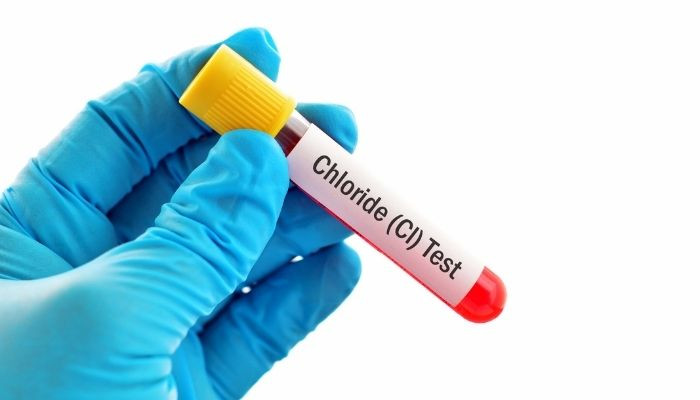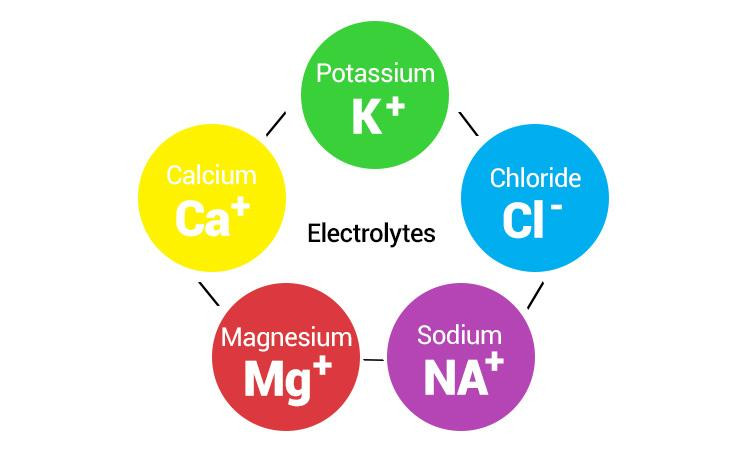Definition
Chloride is one of the essential electrolytes found in the body, alongside sodium and potassium. Electrolytes are minerals that dissolve in body fluids and carry an electrical charge, performing several vital functions in the body, including:
-
Maintaining fluid balance in the body
-
Regulating the body's acid-base balance (pH)
-
Supporting cellular and tissue function by maintaining the electrical charge necessary for life
-
Helping maintain stable blood volume and blood pressure
-
Along with other electrolytes, chloride helps ensure that nerve and muscle tissues function properly
For these reasons, maintaining normal serum chloride levels is crucial for the proper functioning of these bodily processes. Chloride levels can be measured through both blood and urine tests.
The serum chloride test is a routine procedure often performed alongside other electrolyte tests, such as sodium and potassium tests. These tests are conducted to measure the levels of electrolytes in the body and to diagnose or monitor the condition of patients with diseases like kidney disease, heart failure, liver disorders, or high blood pressure.
The results of the serum chloride test can indicate low, normal, or high chloride levels in the blood. These results help detect any conditions that affect chloride levels and can assist doctors in diagnosing diseases and monitoring the effectiveness of treatments.
Additionally, serum chloride tests can also be performed on children, particularly in cases of frequent diarrhea, to detect dehydration. This test is also useful for identifying other medical conditions that may disrupt the electrolyte balance in children’s bodies.
Indication
This test is usually performed under the following conditions:
-
As part of an overall health screening.
-
If symptoms of acid-base imbalance or dehydration are present, such as:
-
Moderate to severe diarrhea
-
Prolonged and frequent vomiting
-
Fatigue or weakness
-
Excessive thirst
-
Shortness of breath
-
-
If there is a history of high blood sugar and cholesterol levels.
-
To support the diagnosis of conditions like kidney disease, heart failure, high blood pressure, and liver disease.
-
To monitor a patient’s condition in certain diseases.
-
To track the success of therapy in patients with fluid and pH imbalances.
Contraindication
There are no specific medical conditions that prevent someone from undergoing this test. The serum chloride test can be safely performed on anyone.
Preparation Before the Test
Before undergoing the serum chloride test, there are a few important preparations to ensure the results are accurate and reflect the true chloride levels in your blood. Inform your doctor about any medications, vitamins, and supplements you are taking. Certain drugs can affect chloride levels, such as medications containing estrogen or diuretics (which increase urine production).
Test Procedure
The test requires a blood sample, typically 0.3 - 0.5 mL, drawn from a vein. This sample is collected into a special tube by laboratory personnel, who will wear gloves and personal protective equipment (PPE) during the procedure.
Before drawing blood, the healthcare provider will apply an elastic band around your upper arm and clean the needle puncture site with antiseptic gauze. Blood is usually drawn from the elbow crease. Once the sample is collected, the elastic band is removed, and pressure is applied to the puncture site, which is then cleaned with antiseptic gauze. The procedure takes only a few minutes. The collected blood sample will be analyzed using specialized laboratory equipment, and results can typically be available within a few hours.
Normal and Abnormal Values
Normal blood chloride values depend on the age of the individual. Below are the standard reference ranges for chloride levels in the blood:
|
Age |
Normal Blood Chloride Values (mEq/L) |
|
Adults |
97-106 mEq/L |
|
Children |
97-106 mEq/L |
|
Infants (0-30 days old) |
98-113 mEq/L |
As seen from the table, the normal chloride range in the blood is consistent for both adults and children, but the normal range for infants (0-30 days) has slightly higher upper limits.
Chloride levels are considered abnormal if the test results fall outside these normal ranges. High chloride levels in the blood, known as hyperchloremia, indicate excess chloride in the body. On the other hand, hypochloremia refers to low chloride levels, both of which may indicate underlying health problems that require further investigation.
Results and Recommendations (Follow-up Tests)
Normal Chloride Levels
Normal blood chloride test results indicate that your body's fluid and chloride balance is functioning properly. To maintain this healthy balance, you can continue a healthy lifestyle by ensuring adequate fluid intake, engaging in physical activity for at least 30 minutes 2-3 times a week, eating a balanced diet, and avoiding alcohol and cigarettes.
High Chloride Levels
Elevated blood chloride levels can be caused by several specific medical conditions. The most common and temporary cause is vomiting. Other causes may include:
-
Severe dehydration
-
Severe diarrhea
-
Kidney disease
-
Metabolic acidosis (a condition with low body pH)
To establish a diagnosis, your doctor will likely review the results of other diagnostic tests in combination with the patient's medical history, symptoms, and physical examination. Depending on the patient's condition, further laboratory tests such as a complete blood count, blood gas analysis, or kidney function tests may be recommended.
Low Chloride Levels
Low blood chloride levels indicate a decrease in the concentration of chloride ions in the body. Several conditions can cause low blood chloride levels, including:
-
Heart disease
-
Insufficient salt intake
-
Lung disease
-
Disorders of the adrenal glands (such as Addison's disease)
-
Excessive sweating
-
Metabolic alkalosis (an increase in body pH)
Your doctor may also recommend additional tests based on the patient’s condition, such as a complete blood count, chest X-ray, blood gas analysis, or abdominal ultrasound.
Consult the Right Doctor
Abnormal chloride results suggest an imbalance in electrolytes or body fluids. For further evaluation, you can consult a general practitioner or an internal medicine specialist to understand your condition better.
Looking for more information about laboratory, radiology, and other examination results? Click here!
- dr Hanifa Rahma
Chloride Blood Test – Medline Plus. medlineplus.org. (2022). Retrieved 13 June 2022, from https://medlineplus.gov/lab-tests/chloride-blood-test/
Ambardekar, D. (2021). What Is a Chloride test?. WebMD. Retrieved 13 Juni 2022, from https://www.webmd.com/a-to-z-guides/what-is-a-chloride-test
Chloride Blood Test – Cleveland Clinic. clevelandclinic.org. (2021). Retrieved 13 June 2022, from https://my.clevelandclinic.org/health/diagnostics/22023-chloride-blood-test
Moore, K. (2018). Chloride Blood Test. Healthline. Retrieved 13 June 2022, from https://www.healthline.com/health/chloride-test-blood#preparation
Muerel, D. (2018). What is the normal chloride level?. MedicalNewsToday. Retrieved 4 Juni 2022, from https://www.medicalnewstoday.com/articles/322314
Normal chloride level in the blood – MRLabtest. mrlabtest.com. (2020). Retrieved 13 June 2022, from https://www.mrlabtest.com/normal-chloride-blood.htm












